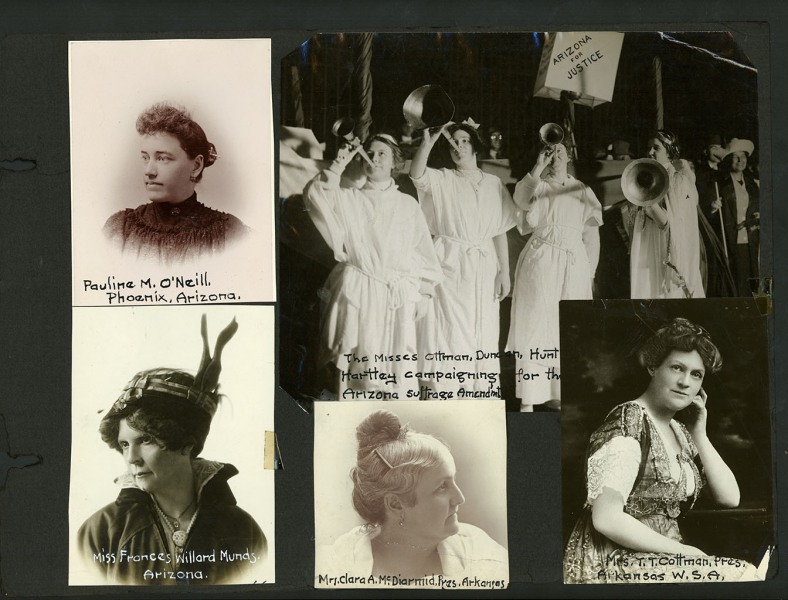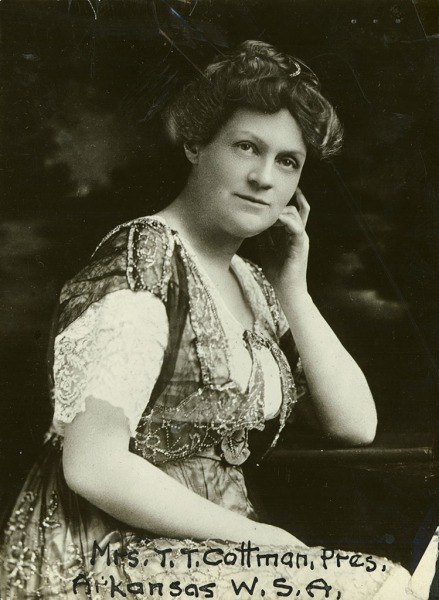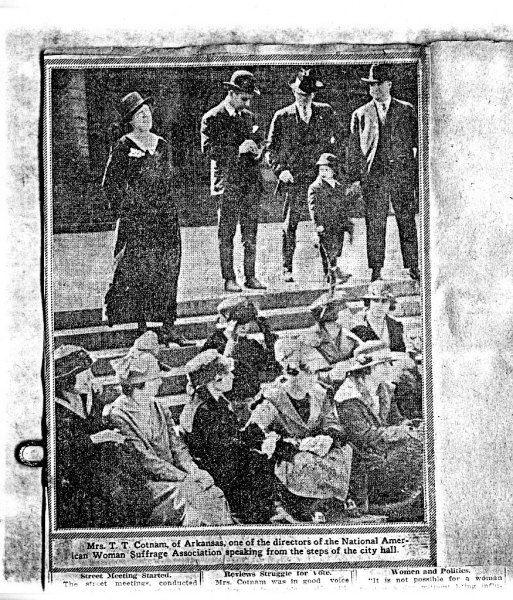Florence Brown Cotnam was born Florence Lee Brown April 16, 1865, in Cobham, Virginia, to Tarleton Woodson Brown and Eliza Webb Thurman. She was the youngest child preceded by ten siblings. Florence dedicated herself to political leadership and using her talents in public speaking for women’s suffrage, citizenship education, and the Democratic Party.
Florence graduated at the age of sixteen from Charnwood Institute in Tyler, Texas, in 1881. She continued her education by studying with elocutionist professors in Tennessee and Illinois for two years after her graduation. Returning to Tyler, Texas, Florence married Thomas Taylor (T. T.) Cotnam on October 20, 1885. They had three children: Charles, Nellie, and Thomas Tarleton Cotnam. In the mid-1890s the family moved to Little Rock, Arkansas, where Florence quickly became a part of the social and political landscape.
Soon after the Cotnam family’s arrival in Little Rock, Florence became one of the founding members of the Edelweiss Club in 1885, holding the office of secretary and treasurer. She was also an active member of the First Presbyterian Church where she participated as a speaker in many plays and productions. Florence acted as dramatic reader in many social entertainments produced by a variety social and political clubs throughout her years in Little Rock. In 1897, she was elected recording secretary of the Aesthetic Club.
Florence used her knowledge and skills as an orator when she became the elocution teacher at Maddox seminary in 1899. As the women’s suffrage movement became more prominent in politics, she used her public speaking abilities to develop support for women’s suffrage in Arkansas and around the country. Florence became involved in and an officer of the Political Equality League, Arkansas League of Women Voters, and Arkansas Woman Suffrage Association, all of which were working toward passing of the 19th Amendment. She quickly became “one of the foremost woman political leaders of the country.” She used her reputation as a persuasive orator and her position in clubs around Little Rock to be the first woman to address the Arkansas Legislature while in session. Due in part to the persuasiveness and eloquence of her speech in favor of women’s suffrage, Governor Charles Hillman Brough was able to call a special session of the legislature to vote on women’s right to vote in primary elections. The passage of the vote for women in primary elections set Arkansas ahead of other southern states, being the first to allow women to vote in primaries.
As a member of the speaker’s bureau of the National League for Women Voters from 1915 to 1920, Florence spoke at public meetings discussing suffrage around the country and developed a reputation as an excellent elocutionist. According to newspaper accounts from across the country, she persuaded men to encourage their representatives to vote for the 19th Amendment. While encouraging citizens and lawmakers across the country to recognize women’s right to vote, Florence participated in state efforts in World War I. Governor Brough describes Florence “as one of the most effective and popular of our ‘four-minute speakers,’” a speaker at theaters during movie intermissions that would extol the patriotism of participating in the war efforts at home.
Once the 19th Amendment passed, Florence turned her attention to educating women who would soon be voting for the first time. She taught in citizenship schools around the country for weeks at a time. Florence educated women on current events, the logistics of voting, and their rights as voters. She increasingly became one of the most sought after instructors for the citizenship schools.
Florence was not only involved in the efforts for women’s suffrage, she was also a consistently active member in the Arkansas and National Democratic Party. Florence was a member in the Arkansas Democratic Women’s Club and the Arkansas Democratic Central Committee. Her talents as an elocutionist were put to use for years nationally campaigning for Democratic presidential candidates. Florence served as western manager for Attorney General Alexander Mitchell Palmer during his campaign in the 1920s to receive the Democratic presidential nomination. She seconded his nomination at the convention in San Francisco. Florence served as delegate from Arkansas to a number of national Democratic conventions.
Florence continued advocating for causes she believed in and participating in various clubs until her death on October 7, 1932, in Little Rock. She is buried in Roselawn Memorial Park. Florence Brown Cotnam was an elocutionist of rare talent and a devoted suffragist throughout
"Chairman of Democratic Women of Arkansas Dies.” Arkansas Gazette 8 October 1932.
CaLee Henderson serves as a project archivist for the Butler Center for Arkansas Studies. She received an MA in Public History from the University of Arkansas at Little Rock in 2014. CaLee is the vice president of the Arkansas Women's History Institute and is active in other Arkansas and archival organizations. Her research interests include women's studies and photographic history.




![Noon-day talk on suffrage by Mrs. T. T. Cotman [Cotnam] of Arkansas at Broadway and Washington Noon-day talk on suffrage by Mrs. T. T. Cotman [Cotnam] of Arkansas at Broadway and Washington](https://ualrexhibits.org/suffrage/wp-content/blogs.dir/14/files/Publications-and-Articles/cache/ualr-ms-0160_na_na_01_06_doc005.jpg-nggid0257-ngg0dyn-800x600-00f0w010c010r110f110r010t010.jpg)